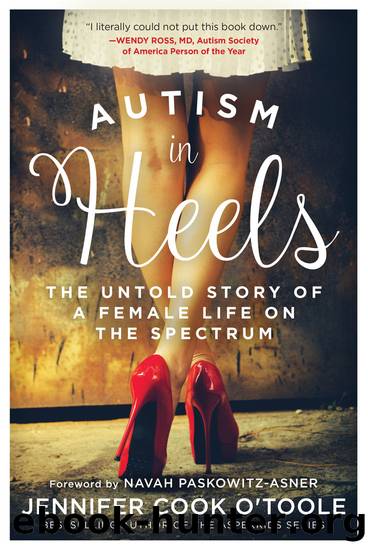Autism in Heels - The Untold Story of a Female Life on the Spectrum by Jennifer Cook O & #39;Toole

Author:Jennifer Cook O & #39;Toole
Language: eng
Format: mobi
Publisher: Skyhorse Publishing
Published: 2018-09-14T22:00:00+00:00
Affective/Emotional Empathy: What Happens Once We Know
People on the autism spectrum do not react to as many interpersonal situations as neurotypicals expect (and often as experience has taught autistic people to expect, too). That is absolutely true. The big problem for us is that as long as professionals and the public mistake perspective-taking “cognitive empathy”/“theory of mind” for empathy in general, we are wildly misunderstood as being cold, shut off, and uncaring, when nothing could be further from the truth.
Once we remove the perspective-taking pitfalls, we’re talking more about catching feelings than understanding thinking—we’re talking “affective” or “emotional” empathy. Formally, it’s our ability to respond with an appropriate emotion to another’s mental state. Informally, it’s how we feel and behave if/when we understand what someone else is going through. Largely, it’s what we usually refer to as sympathy or compassion—feeling delighted or afraid or concerned or thrilled for someone, doing what we can to alleviate any suffering, and securing them in love. That’s emotional empathy. And that we’ve got in spades.
In our Denver keynote, Dr. Gatto-Walden had explained that “ethically, morally, spiritually, the children I’m describing care so much that they see the world as their global community. See others’ pain as theirs to champion. Their responsibility.”
Yes, yes, and yes. Instantly, I remembered being a child and racing home to call 911—a squirrel had been run over in the street but wasn’t actually dead. It needed help. And there was so much more. As a college freshman, I’d collected all the loose dogs on the campus main green, mistaking them for strays. Prepared to call security with a makeshift leash and somewhat of a chaotic pack at my heel, I’d been stopped at the phone by a really big senior. “Hey,” he’d rumbled, “um, that’s my dog.” (Perspective-taking fail and giant—if not graceful—empathy win.)
In high school, my tennis teammates nicknamed me “Happy Head.” I bounced across courts, constantly singing little tunes, smiling at everyone, getting even the crankiest upperclassmen to smile back. On summer breaks, I worked as a camp counselor, playing in creeks and making lanyard bracelets right alongside the kids. During college, my sorority sisters made me their ritualist—the president was the “head” of the chapter, I was the “heart.” And over those summers, I taught adult English as a second language classes on the outskirts of Providence. After Brown, I went to Columbia University’s Graduate School of Social Work in New York to study the emotional dynamics and communication techniques of family and individual therapy. Every other day, I set out for fieldwork as a counselor in an inner-city high school in the Bronx. Two subway trains, a mile-long walk through open lots, and a pat-down at the entrance, and finally … the kids.
My first paid job was as a dating and domestic violence counselor. Disregarding important personal boundaries, I answered pages at all hours. I changed diapers. I compiled inspiring playlists. And eventually, I burned out … I just couldn’t not help, even when it meant running myself to emotional and physical exhaustion.
Download
This site does not store any files on its server. We only index and link to content provided by other sites. Please contact the content providers to delete copyright contents if any and email us, we'll remove relevant links or contents immediately.
We're Going to Need More Wine by Gabrielle Union(18072)
Bombshells: Glamour Girls of a Lifetime by Sullivan Steve(13108)
Pimp by Iceberg Slim(12931)
The Radium Girls by Kate Moore(10907)
Becoming by Michelle Obama(9291)
The Girl Without a Voice by Casey Watson(7262)
Educated by Tara Westover(7061)
Wiseguy by Nicholas Pileggi(4586)
The Wind in My Hair by Masih Alinejad(4424)
Hitman by Howie Carr(4376)
On the Front Line with the Women Who Fight Back by Stacey Dooley(4311)
Hunger by Roxane Gay(4216)
Year of Yes by Shonda Rhimes(4114)
The Rules Do Not Apply by Ariel Levy(3905)
The Borden Murders by Sarah Miller(3590)
Papillon (English) by Henri Charrière(3269)
Joan of Arc by Mary Gordon(3258)
Patti Smith by Just Kids(3227)
How to be Champion: My Autobiography by Sarah Millican(3186)
